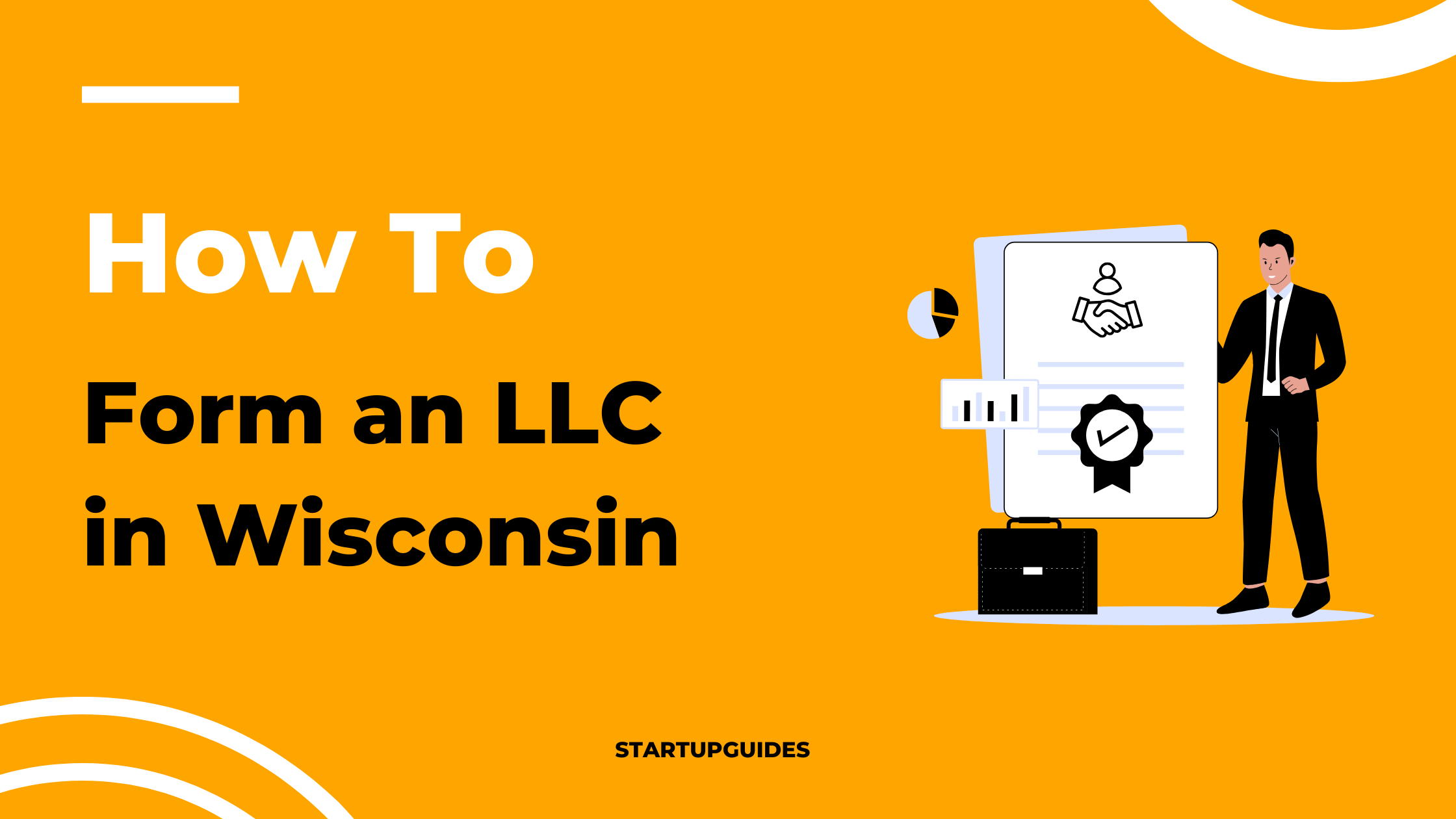Starting a business in Wisconsin can be an exciting venture. Whether you’re setting up a bakery in Madison or a tech startup in Milwaukee, the state offers a variety of opportunities and resources to help new entrepreneurs succeed. In this guide, we will walk you through the entire process of starting a business in Wisconsin, from creating a business plan to registering your business and getting it off the ground.
Let’s dive into the step-by-step process of how you can start a business in the Badger State.
How to Start a Business in Wisconsin?
Starting a business is a major milestone, but it requires a clear understanding of what is involved. Setting up a business in Wisconsin involves a series of steps that will lay the foundation for a successful venture. These steps include writing a business plan, choosing a business entity, estimating startup costs, naming your business, registering it, and obtaining the necessary licenses and permits. We’ll break down each of these steps to give you a clearer picture of the process.
Step 1: Create a Business Plan
The first step to starting any business is to write a business plan. A business plan acts as a roadmap for your business, outlining how your business will run, the target market, financial projections, and long-term goals. Having a solid business plan is crucial whether you plan to seek funding or just want to have a clear idea of how your business will operate.
Here are the key components to include in your business plan:
1. Executive Summary
This section provides an overview of your business and its goals. It should be concise yet informative, summarizing your mission, vision, and the purpose of your business.
2. Business Description
Here, you explain what your business does and the market needs it addresses. This section should also include your business’s unique selling proposition (USP), which differentiates it from competitors.
3. Market Analysis
Conducting a market analysis is essential to understanding your target audience and the competitive landscape. This section should contain data about the industry, potential customer demographics, trends, and competitor analysis.
4. Organization and Management
Outline the structure of your business, who is involved, and their roles. If you have a team or plan to hire employees, mention their qualifications and expertise.
5. Products or Services
Detail the products or services you will offer. Discuss how they will meet the needs of your customers and how you plan to deliver them.
6. Marketing and Sales Strategy
This section explains how you will promote your business to your target audience. This includes advertising strategies, sales methods, pricing, and distribution.
7. Financial Projections
Financial projections are critical for understanding how much money you need to start and maintain the business. It includes estimated income, expenses, and profit margins for the first few years of operation.
8. Funding Request (If Applicable)
If you plan to seek funding from investors or lenders, this section should detail how much funding you need and how you will use it.
Why Is a Business Plan Important?
A well-thought-out business plan will help you stay organized, track your progress, and convince potential investors or lenders that your business is worth funding. It serves as a tool for planning and helps you anticipate challenges in advance.
Step 2: Choose a Business Entity in Wisconsin
The next step is to decide what type of business structure you want to establish. The business entity you choose will affect your liability, tax obligations, and other legal requirements. There are several business entities available in Wisconsin, each with its advantages and disadvantages.
1. Sole Proprietorship
A sole proprietorship is the simplest form of business structure. It is owned and operated by a single person. While it is easy to set up, the owner is personally liable for any debts or legal issues the business faces.
2. Limited Liability Company (LLC)
An LLC is a popular business structure that provides liability protection to its owners (members). This means that if your business incurs debt or is sued, your personal assets are protected. LLCs also have fewer formalities and less paperwork compared to corporations, which makes them an appealing choice for many entrepreneurs.
3. Limited Liability Partnership (LLP)
An LLP is similar to an LLC but is designed specifically for professional businesses such as law firms, accounting practices, and consulting firms. It provides liability protection for partners while allowing them to manage the business directly.
4. Corporation
A corporation is a separate legal entity from its owners (shareholders). It provides the highest level of liability protection but also involves more paperwork, ongoing reporting, and higher costs. Corporations can be an ideal choice for businesses that plan to raise capital through stock offerings or those that want to establish a large-scale enterprise.
Step 3: Determine Your Wisconsin Business Costs
One of the most critical aspects of starting a business is understanding your costs. These costs will vary depending on your business type, industry, and location in Wisconsin, but here are some common expenses you should consider:
- Business Registration Fees: There will be fees associated with registering your business entity, such as filing Articles of Organization for an LLC or Articles of Incorporation for a corporation.
- Licenses and Permits: Some businesses in Wisconsin are required to obtain specific licenses and permits. These might include health permits, professional licenses, or zoning permits, depending on the nature of your business.
- Insurance: Insurance is an important part of business operations, especially if you have employees or customers. Common types of business insurance include general liability insurance, workers’ compensation insurance, and property insurance.
- Equipment and Supplies: Consider the cost of any equipment, inventory, or office supplies you will need to get started.
- Marketing and Advertising: You’ll need to set aside a budget for marketing and promoting your business to attract customers.
- Operating Costs: This includes rent, utilities, employee salaries, and other ongoing operational expenses.
It is crucial to create a detailed budget to determine how much money you’ll need to start and maintain your business in the first few months or years. Many new businesses underestimate their initial costs, so having a comprehensive financial plan is important.
Step 4: Name Your Business in Wisconsin
Choosing the right name for your business is essential. Your business name will be the first impression many people have of your company, so it should be unique, memorable, and easy to pronounce. Follow these steps to choose a name:
1. Brainstorm Ideas
Consider names that reflect your business’s purpose, mission, and brand values. The name should give potential customers an idea of what your business offers.
2. Check Availability
Once you’ve come up with a few names, you’ll need to make sure that no one else is using it. In Wisconsin, you can check name availability through the Department of Financial Institutions (DFI) to make sure your name is unique and hasn’t been taken by another business.
3. Register the Name
If you’re using a business name other than your personal name, you must register it with the county clerk’s office as a “Doing Business As” (DBA) name.
4. Secure Your Domain Name
In today’s digital age, it’s essential to secure a website domain that matches your business name. This will ensure your online presence is cohesive and easy for customers to find.
Step 5: Register Your Business in Wisconsin
Once you’ve chosen a business structure and a name, you’ll need to register your business with the state of Wisconsin. This involves several steps:
1. Get a Registered Agent
In Wisconsin, most business entities, such as LLCs and corporations, are required to have a registered agent. A registered agent is an individual or business entity that receives legal documents and government notices on behalf of your business.
2. Apply for Wisconsin Formation Documents
Depending on the business structure you choose, you will need to file the appropriate formation documents with the Wisconsin Department of Financial Institutions (DFI):
- For an LLC, you’ll file Articles of Organization.
- For a corporation, you’ll file Articles of Incorporation.
These forms can usually be submitted online through the DFI’s website. Be prepared to pay a filing fee.
3. Request an EIN (Employer Identification Number)
If your business has employees or operates as a corporation or LLC, you will need to apply for an Employer Identification Number (EIN) from the IRS. This number is used for tax purposes and is necessary to hire employees or open a business bank account.
Step 6: Apply for Business Licenses and Permits
Depending on your business type, you may need specific licenses or permits to operate legally in Wisconsin. Common types of business licenses and permits include:
- State Licenses: Some businesses, such as those selling goods or services, may need to register for sales tax permits or other state-required licenses.
- Local Permits: Depending on where you’re located, your local city or county government may require you to obtain zoning permits, health permits, or building permits.
- Industry-Specific Licenses: Certain industries, such as healthcare, construction, and financial services, may require specific licenses or certifications.
It’s essential to check with the appropriate authorities to determine which licenses and permits you need to operate legally.
Step 7: Get a Bank Account
Once your business is registered, it’s time to set up a business bank account. Having a separate business account will help you manage finances, track business expenses, and keep your personal and business finances separate.
To open a business bank account, you’ll need to provide:
- Your EIN
- Formation documents (e.g., Articles of Organization or Articles of Incorporation)
- A valid ID
- Business licenses or permits
A separate business account will make it easier to track revenue and expenses, especially during tax season.
Step 8: Market Your Business in Wisconsin
Once your business is up and running, you’ll need to get the word out. Marketing is essential for attracting customers and growing your business. Here are a few ways to market your business in Wisconsin:
1. Online Presence
In today’s digital world, having an online presence is a must. Create a professional website that clearly explains your products or services. Also, set up profiles on social media platforms such as Facebook, Instagram, and LinkedIn.
2. Networking
Networking is an effective way to meet potential customers and other business owners. Consider joining local business organizations such as the Wisconsin Chamber of Commerce or attending local events to grow your network.
3. Local Advertising
Use local advertising channels such as newspapers, radio, or billboards to reach your target audience. Many small businesses find success in advertising locally to increase brand awareness.
4. Promotions
Offer promotions or discounts to attract customers. This could include special offers for first-time customers, seasonal sales, or loyalty programs to encourage repeat business.
Important Information
Do You Need to Have Business Insurance?
While business insurance is not required by law for all businesses, it is highly recommended. Business insurance helps protect your business from unexpected situations, such as property damage, liability claims, or worker injuries.
There are different types of business insurance, including:
- General Liability Insurance: Protects your business against claims of injury or damage caused by your products or services.
- Professional Liability Insurance: Covers professional mistakes or negligence in the services you provide.
- Workers’ Compensation Insurance: Required if you have employees and covers medical expenses for work-related injuries.
Consult with an insurance agent to determine which types of insurance are best for your business.
What Is the Most Profitable Type of Business?
Profitability depends on several factors, including your industry, business model, and target market. However, businesses in industries such as technology, healthcare, and manufacturing tend to be highly profitable in Wisconsin. When choosing a business idea, conduct thorough market research to identify the most profitable opportunities in your area.
FAQs
How much does it cost to start a business in Wisconsin?
Startup costs vary based on your business type, location, and industry. On average, you can expect to pay for registration fees, licenses, permits, equipment, marketing, and insurance. Make sure to budget carefully.
Can I start a business from home in Wisconsin?
Yes, many people start businesses from home in Wisconsin. However, you will need to check your local zoning laws to ensure that home-based businesses are allowed in your area.
Are there grants available for new businesses in Wisconsin?
Yes, the Wisconsin Economic Development Corporation (WEDC) offers various grants and programs to support new businesses. Check their website for more details.





